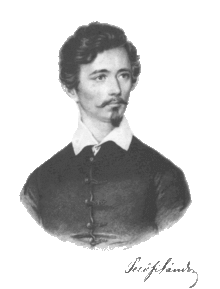Sándor Petőfi
| Sándor Petőfi Petőfi Sándor (hu) Alexander Petrovics (la) |
|
|---|---|

Portrait of Petőfi painted by Miklós Barabás
|
|
| Born |
1 January 1823 Kiskőrös, Kingdom of Hungary, Austrian Empire |
| Died | 31 July 1849 (aged 26) Fehéregyháza, Grand Principality of Transylvania, Austrian Empire; (Now Albești, Romania) |
| Resting place | unknown |
| Occupation | poet, revolutionary |
| Language | Hungarian |
| Nationality | Hungarian |
| Period | 1842–1849 |
| Notable works | National Song, John the Valiant |
| Spouse | Júlia Szendrey |
| Children | Zoltán Petőfi |
Sándor Petőfi (born Petrovics;Hungarian: Petőfi Sándor pronounced [ˈpɛtøːfi ˈʃaːndor]; Slovak: Alexander Petrovič;Serbian: Александар Петровић; 1 January 1823 – most likely 31 July 1849) was a Hungarian poet and liberal revolutionary. He is considered Hungary's national poet, and was one of the key figures of the Hungarian Revolution of 1848. He is the author of the Nemzeti dal (National Song), which is said to have inspired the revolution in the Kingdom of Hungary that grew into a war for independence from the Austrian Empire. It is most likely that he died in the Battle of Segesvár, one of the last battles of the war.
Petőfi was born in the early New Year's morning of 1823, in the town of Kiskőrös (Kingdom of Hungary, then part of the Austrian Empire). The population of Kiskőrös was predominantly of Slovak origin as a consequence of the Habsburgs' reconstruction policy designed to settle, where possible, non-Hungarians in areas devastated during the Turkish wars. His birth certificate in Latin, gives his name as "Alexander Petrovics", where "Alexander" is the Latin equivalent of the Hungarian "Sándor". His father, István (Stefan) Petrovics, was a village butcher, innkeeper and he was a second-generation Serb or Slovak immigrant to the Great Hungarian Plain. Mária Hrúz, Petőfi's mother, was a servant and laundress before her marriage. She was of Slovak descent and spoke Hungarian with something of an accent. Petőfi's parents first met in Maglód, married in Aszód and the family moved to Kiskőrös a year before the birth of the poet.
...
Wikipedia
